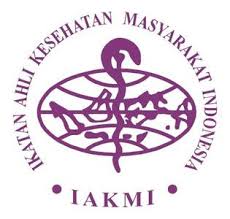Determinan Perilaku Pencegahan Covid-19 Pada Lansia
Abstract
ABSTRAK
Diketahui pada rentan waktu 11 Maret 2021 telah terjadi kasus positif COVID-19 di wilayah kerja Puskesmas Bandarharjo sebanyak 719 terkonfirmasi, 53% terjadi kasus positif COVID-19 pada kelompok lanjut usia yang mencapai 385. Kasus kematian yang disebabkan oleh COVID-19 ini mencapai 81 jiwa, 69,13% terjadi pada lansia, yaitu sebanyak 56 jiwa. Penelitian ini menggunakan studi deskriptif analitik dengan pendakatan cross-sectional. Populasi lansia di wilayah kerja Puskesmas Bandarharjo. Sampel penelitian sebesar 105 responden, teknik purposive sampling. Instrumen penelitian berupa kuesioner, data dianalisis menggunakan uji Chi-Square. Hasil penelitian menunjukkan bahwa terdapat variabel yang berhubungan dengan perilaku pencegahan COVID-19 pada lansia yaitu jenis kelamin (p= 0,003), pengetahuan (p= 0,037), sikap (p= 0,009), komorbiditas (p= 0,000), dukungan keluarga (p= 0,003), dan dukungan kader (p= 0,002). Variabel yang tidak berhubungan dengan perilaku pencegahan COVID-19 yaitu status pekerjaan (p= 0,557) dan sarana prasarana kesehatan yang dimiliki (p= 0,425). Simpulan dari penelitian ini adalah jenis kelamin, pengetahuan, sikap, komorbiditas, dukungan keluarga, dan dukungan kader berhubungan dengan perilaku pencegahan COVID-19 pada lansia.
ABSTRACT
There were positive cases of COVID-19 in the working area of the Bandarharjo Health Center on March 11, 2021, with as many as 719 confirmed cases; 53% of positive cases of COVID-19 occurred in the elderly group, which reached 385.COVID-19 caused the deaths of 81 people, with the elderly accounting for 69.13% of the total, or 56 people.This research uses a descriptive analytic study with a cross-sectional approach. the elderly population in the working area of the Bandarharjo Health Center. The research sample consists of 105 respondents, selected using the purposive sampling technique. The research instrument was a questionnaire. The Chi-Square test was used to analyze the data.The results showed that there were variables related to COVID-19 prevention behavior in the elderly, namely gender (p = 0.003), knowledge (p = 0.037), attitude (p = 0.009), comorbidity (p = 0.000), family support (p = 0.003), and cadre support (p = 0.002). Variables that were not related to COVID-19 prevention behavior were employment status (p = 0.557) and ownership of health infrastructure (p = 0.425). The conclusions from this study are that gender, knowledge, attitudes, comorbidities, family support, and cadre support are associated with COVID-19 prevention behavior in the elderly.




